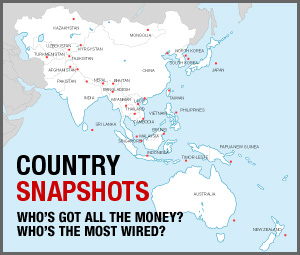China’s Not a Superpower 
 Image: Poeloq
Image: Poeloq
A possible democratic transition is not the only thing feared by the Chinese ruling elites–ethnic secessionism may be even more threatening. For all intents and purposes, China is not a nation-state, but a multi-national empire with huge chunks of its territory (Tibet and Xinjiang) inhabited by secessionist-minded minority groups. The risks of internal fragmentation, on top of the perennial Taiwan problem, will mean that China will have to devote enormous military and security resources to defending its territorial integrity. This structural weakness makes China less able to project power abroad and more vulnerable to the machinations of its competitors, who could exploit China’s ethnic tensions to tie Beijing’s hands.
Geopolitically, the limits on Chinese power will be equally severe. While the United States is blessed by weak neighbours, China has to contend with strong regional rivals–India, Japan, and Russia. Even China’s middle-sized neighbours, South Korea, Indonesia, and Vietnam, are no pushovers. China’s rise has already triggered a regional geopolitical realignment aimed at checking Beijing’s ambitions and reach. For example, the United States has greatly expanded its strategic cooperation with India so that New Delhi will be able to stand up to Beijing. Japan has also increased its economic aid to India for the same strategic purpose. Even Russia, China’s partner of convenience for the moment, remains guarded about China. Moscow has refused to sell Beijing top-line weaponry and limited its energy supplies to China. For all its anti-American rhetoric, South Korea still counts on the United States for its economic prosperity and security. As for Vietnam and Indonesia, the two Southeast Asian countries most sceptical about China’s future intentions, they are hedging their bets carefully. While trying not to offend China openly, they have significantly improved their ties with the United States and Japan, China’s implicit regional rivals.
As a result of such geopolitical counter-balancing, China will be unable to become a hegemon in Asia–a power with complete dominance over its regional rivals. By definition, a country cannot become a global superpower unless it is also a regional hegemon, such as the United States. As a great power hemmed in by powerful and vigilant neighbours, China must constantly watch its back while trying to project power and influence on the global stage.
Such a status–a globally influential great power, but not a dominant superpower–is something nobody should dismiss lightly. Pax Americana is an accident of history that cannot be copied by another country. For the world, it should not be obsessed by the fear that China will become another superpower. Instead, it should learn to live with China as a great power.
The question is: what kind of great power is China?
Ironically, while the rest of the world has taken China’s future as a superpower for granted, Chinese leaders themselves are more aware of the inherent limits of the country’s strength. As a result, Beijing exercises its newly acquired clout with extreme caution, eschewing external entanglements, frowning upon direct military presence abroad, avoiding costly international obligations and living with the international economic and security order established and dominated by the United States. Of course, China guards its national interests, particularly its sovereignty, jealously. On matters of its territorial integrity and economic well-being, Beijing seldom hesitates to flex its muscles. But it draws the line on empire-building overseas via the extension of its military power.
So for the foreseeable future, China will be, at best, only an economic superpower by virtue of its role as one of the world’s greatest trading powers (in this sense, both Germany and Japan should be considered economic superpowers as well). Its geopolitical and military influence, meanwhile, will remain constrained by internal fragilities and external rivalry.
While China will always have a seat at the table on the global stage, its willingness and capacity to exercise leadership will most likely disappoint those who expect Beijing to behave like a superpower. It’s not that China doesn’t want to be a superpower. The simple truth is that it is not, and will not be one.
Minxin Pei is the Tom and Margot Pritzker ’72 Professor of Government at Claremont McKenna College. His latest book is ‘China: Trapped Transition (2006).’










